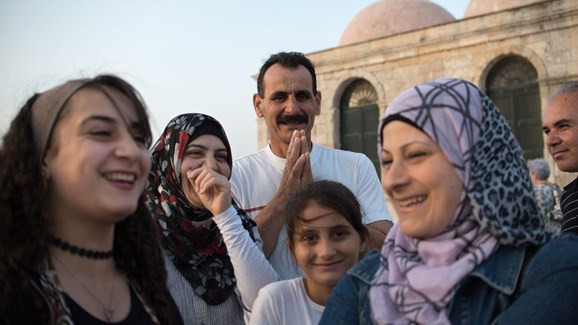Syrian refugees' journey back to their roots after 130 years
BBC recently published an article recounting a Syrian refugee family's journey to find their roots after 130 years.
Walking into a small shop in the town of Chania on the Greek island of Crete, Ahmed, 42, began to introduce himself. The shopkeeper looked at Ahmed, his mouth agape. He understood what he was saying, but some of the words Ahmed spoke were “outdated” and others were incomprehensible to him. It was as if Ahmed were not just from Syria but from another era. “He couldn’t believe that people still spoke that ancient language,” Ahmed said.
Ahmed speaks a form of Cretan dialect, which he learned from his parents, who spent their entire lives in Syria. But Ahmed’s grandparents were born on Crete, and Cretan culture has been preserved through the generations. “We learned Arabic at school, but at home we always spoke Greek,” Ahmed says. Children learned Greek dances and short Cretan poems, while parents passed down traditional recipes such as fried snails. Marriage to native Syrians was rare; Ahmed’s wife, Yasmine, also had Cretan roots.
 |
| The Ahmed family on the Greek island of Crete. Photo BBC. |
Ahmed’s grandparents were forced to leave Crete in the 1990s as the Ottoman Empire weakened. The island had been under Ottoman rule for two centuries, and nearly a quarter of the population, including Ahmed’s ancestors, had converted to Islam. However, revolts in the late 19th century saw Crete’s Muslims expelled. While others fled to Türkiye, Libya, Lebanon, or Palestine, Ahmed’s grandparents fled to al-Hamidiyah, a village in Syria established for refugees by Sultan Abdul Hamid II of the Ottoman Empire.
Years later, the 10,000 residents of al-Hamidiyah still “keep in touch” with modern Crete by watching Greek satellite television, and some villagers still return to the island from time to time to work. “Crete has always been a part of our hearts. Our grandparents used to tell us how beautiful Crete was and how rich life was there. We always wanted to visit Crete but never had the chance,” Ahmed said.
Then the Syrian civil war broke out, and they had little choice. Ahmed’s sisters and their families were among the first to leave Syria for Crete. Meanwhile, Ahmed struggled to find work after suffering a herniated disc and struggled to find enough money to pay a smuggler. Finally, in the spring of 2017, he, his wife, and their four children left Syria for Greece.
It took Ahmed’s family three months to reach Greece, including a dangerous journey from Türkiye to the Greek island of Lesbos on a rickety boat that could sink at any moment. During his first asylum interview, when asked to show his passport, Ahmed deliberately placed his finger next to Tarzalakis, his distinctive Cretan surname. “The interviewer started shouting to his colleagues: ‘Look, there’s a Cretan here. Come and see!’ People started crowding around out of curiosity,” Ahmed said.
Despite knowing that there are Cretan communities abroad, many Greeks still find the Tarzalakis’ dialect fascinating. Their accent is distinctly Cretan, but much of the vocabulary they learned in Syria is no longer used in Crete or mainland Greece. “But with a little patience, we can understand each other,” Ahmed said. Although they speak it, the Ahmeds never learned to read or write it, so they still need help filling out asylum forms.
After a month on Lesbos, Ahmed and his family were granted asylum in August 2017. They immediately took a boat to Crete, where their sisters and relatives living in Chania were waiting. When they arrived, Ahmed was admitted to hospital with problems stemming from his chronic epilepsy. The medical staff were amazed to hear Ahmed speaking in an ancient dialect. They immediately contacted a reporter from the local newspaper. “By the time I was discharged, everyone in Chania knew me. When I met them on the street, people would stop and ask me about the Syrian civil war. They saw us as Cretans who had returned,” Ahmed shared.
Ahmed had been looking for his grandparents’ former village of Skalani, on the outskirts of Crete’s capital Heraklion. Although it was his first visit, he had heard about it all his life. “I couldn’t find the exact houses, but the locals showed me the fields where the Muslim community used to live,” Ahmed said.
Ahmed’s family are now learning to read and write Modern Greek and his children have been enrolled in school. “We are learning new phrases but we are still keeping our language because it is part of our heritage,” Ahmed said.
